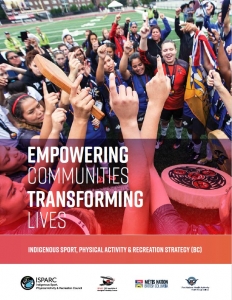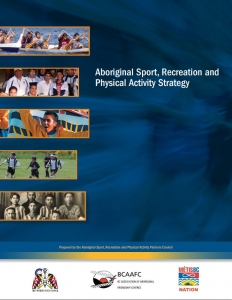A Renewed Strategy
The year 2018 marked the 10-year anniversary of the development of the Aboriginal Sport, Recreation and Physical Activity Strategy. Important work has been accomplished over the past decade and the level of transformational change in the health and well-being of First Nations, Métis, and Inuit people across the province continues to grow.
In order to continue to meet the needs of the communities it serves, the Strategy needed to grow too. The focus of the renewed Strategy remains consistent—to contribute to a healthier future for individuals, families, and Indigenous communities by making participation in sport, physical activity and recreation a priority. By applying a holistic perspective on health and wellness, which is a common thread across our diverse cultures, the Strategy acknowledges the interconnectedness of the physical, mental (intellectual and emotional), cultural, and spiritual facets of life.
Two important foundational documents underpin this renewed Strategy: the United Nations Declaration on the Rights of Indigenous Peoples and the Truth and Reconciliation Commission’s Calls to Action. These documents inform and guide the Strategy and the day-to-day work being conducted in communities across BC to create positive and engaging sport, physical activity, and recreation opportunities that contribute to the improved health and well-being of Indigenous peoples.
The Strategy continues to employ a youth-centered approach and emphasizes provincial leadership, which allows regionally and locally generated priorities to be considered and community-based programs to be delivered. It also recognizes that since more than 75% of Indigenous people are now living in urban areas, continuing to connect with this rapidly changing demographic is vital. The Strategy also recognizes the need to increase the number of collaborative partnerships within the mainstream and Indigenous sport, physical activity, recreation, and healthy living systems.
The Indigenous Sport, Physical Activity and Recreation Council (I·SPARC), together with the BC Association of Aboriginal Friendship Centres (BCAAFC), First Nations Health Authority (FNHA), and Métis Nation BC (MNBC), provides stewardship over the Strategy with a unified commitment to use the power of sport, physical activity, and recreation to achieve transformational change. I·SPARC’s continued role is to implement and deliver on this new “roadmap,” which will advance the kind of meaningful and sustainable impact envisioned by its founders.
Downloadable copy of the renewed strategy: “Empowering Communities, Transforming Lives” available here:
 2019: Renewed Indigenous Sport, Recreation and Physical Activity Strategy (BC): “Empowering Communities, Transforming Lives” – The renewed strategy is organized and supported by four Pillars that, through the sum of their actions, will create responsive and enduring programs for Indigenous people across BC and will have a positive impact on the health and well-being of individuals, families, and communities.
2019: Renewed Indigenous Sport, Recreation and Physical Activity Strategy (BC): “Empowering Communities, Transforming Lives” – The renewed strategy is organized and supported by four Pillars that, through the sum of their actions, will create responsive and enduring programs for Indigenous people across BC and will have a positive impact on the health and well-being of individuals, families, and communities.
-
-
-
- HEALTHY LIVING – Self-Empowerment
- SPORT – Strengthening Pathways
- ENGAGEMENT – Inspiring Participation
- SUSTAINABILITY – Building Capacity
-
-
–
 2009: Aboriginal Sport, Recreation and Physical Activity Strategy (BC) – The Strategy took a youth-centered approach, inspired by the BC Aboriginal Youth Sport and Recreation Declaration, established during the 2008 Gathering Our Voices youth conference.
2009: Aboriginal Sport, Recreation and Physical Activity Strategy (BC) – The Strategy took a youth-centered approach, inspired by the BC Aboriginal Youth Sport and Recreation Declaration, established during the 2008 Gathering Our Voices youth conference.

